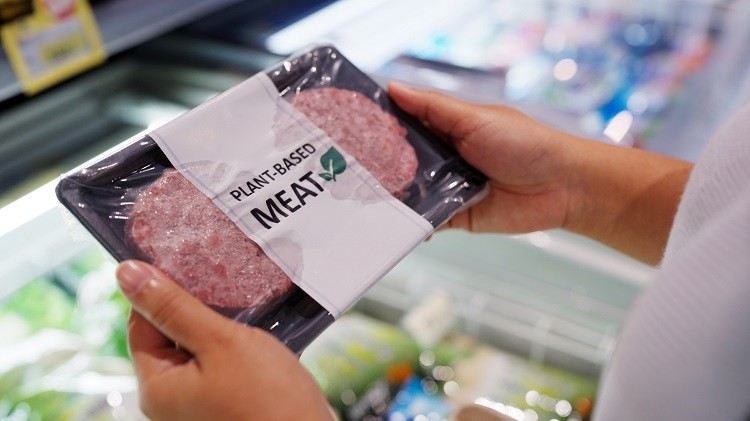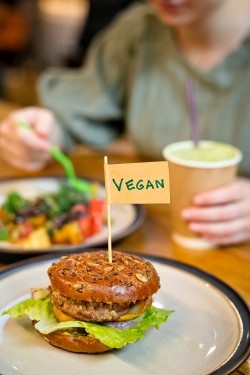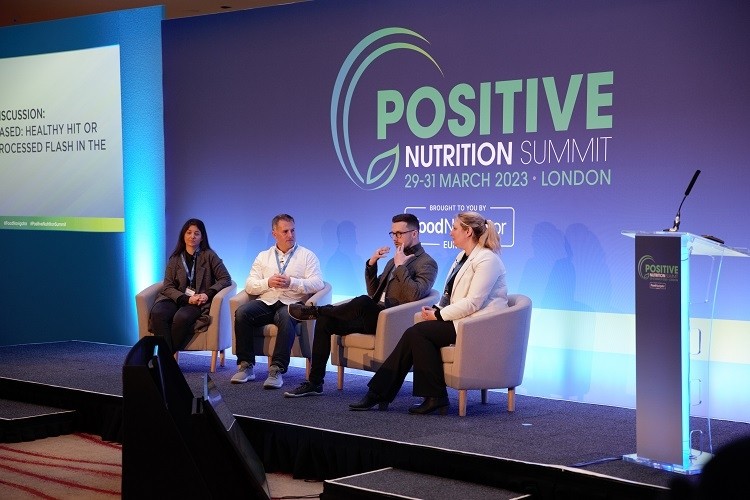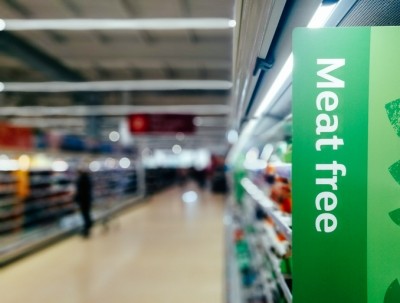‘What is naturalness?’ The future of plant-based food

Plant-based food is an important and growing category in the food industry. According to Grand View Research, the global vegan food market is expected to grow at 10.6% compound annual growth rate (CAGR) per year between 2022 and 2030, reaching $37.45bn by 2030.
At FoodNavigator’s Positive Nutrition Summit in March, which took place in central London, experts discussed the future of plant-based.
Health benefits of plant-based
Despite the popularity of plant-based products, many have criticised them as being ultra-processed.
Jeff Webster, Chief Visionary Officer at keto, paleo and gluten-free condiment company Hunter and Gather, which boasts that it says “'no' to chemical preservatives, bulkers or E numbers,” argued that we should be wary of plant-based foods because of the fact they’re so processed.
He spoke about the “1920s and 1930s, when we were displacing traditional foods with ultra-processed grains and flours. These guys were having all sorts of issues with health, their jaws were smaller, they were losing teeth, [getting] brittle bones, and all sorts of things.
“Go back to tobacco,” he said, “at one point that was a fast growth category, and everyone thought it was amazing. But we’ve always got to check ourselves and question things, in terms of macronutrient profile.”
On the surface, he said, plant-based meat may look nutritionally similar to traditional meat. However, “diving into micronutrients, and minerals, and vitamins and cofactors, and enzymes and peptides…” reveals that there’s more nuance to the picture.

However, Rob Reames, VP Commercial at Swiss plant-based start-up Planted, emphasised that with clean ingredients, plant-based food can be healthy. While it’s easy to criticise food for being ultra-processed, instead, consumers should look at ‘what's actually in’ these products.
“There are products that are nutritionally pretty close to what real meat is providing. That's the same in terms of both protein and fibre . . . I think the industry is progressive, and it's getting pretty good . . . but I think it's definitely a balance, and I think that's something that we're focused on . . . always having a clean ingredient list. So that's a given.
“But we're also looking at diversity of proteins, right? Different plants provide different amino acid profiles. And I think that's something that we want to work on to improve the number of different grains and pulses and things you can bring into your diet.”
It’s not just about “looking at it from an ultra-processed point of view but now looking at what's in the ingredients themselves . . . I think this is about ingredient-led clean ingredients as much that is about ultra-processed.”
Julia Martin, Programme Manager & Scientific Lead at ProVeg Incubator, went further. She said that plant-based food can provide nutrients, in some cases, that traditional meat cannot. “A lot of our fantastic companies that develop plant-based meats, they're also adding fibres, they're also reinforcing a lot of other health benefits that are not present in in, naturally clean animal meats.”
Science, she said, is taking us to a place where plant-based meat can provide something closer to animal meat than it has in the past. “Taking a step forward, I think this is really where science is going to be showing the best in this direction over the next five to 10 years, for example, with initiatives such as precision fermentation, with which we're producing strictly, animal reference ingredients . . . and that these are going to be biochemically equivalent.”
Some manufacturers of traditional animal products argue that the ‘naturalness’ of their products makes them better than the plant-based alternatives. But Martin is not convinced. “What is naturalness? We don't mean it as a marketing tool. Isn’t ‘natural’ everything that's coming from biotic activities such as human activities?
“And how is that empty (in my opinion) concept of ‘natural’ helping the consumer out there making better informed decisions about the sustainability and ethical health concerns or implications of the food choices they make?”
A green future?
Plant-based food, and the vegetarian and vegan diet more generally, is often billed as a more environmentally friendly, greener alternative to traditional meat and dairy. But what opportunities do plant-based products offer to us in terms of sustainability, and how does it compare to that of its animal-based counterpart?
Planted's Reames stressed that plant-based food is more sustainable because it removes a major component to the environmental impact of food production: the animal itself. “It's skipping the animal, right?” he said. “First of all, when you skip an animal, you take out a whole lot of the carbon footprint and the water footprint.”
Furthermore, the many benefits of plant-based meat, such as the environmental benefits, “for most consumers. . . would outweigh the fact that it's processed. And that's what people are engaged in, what they’re interested in.”
Hunter and Gather's Webster, on the other hand, was sceptical about plant-based food’s potential for sustainability and pointed out the damage that cultivation of some crops can do to the environment, a process where the animal is still impacted despite the fact it isn’t in the process of producing an ‘animal-based’ product.
“You've got animals that are essentially collateral in terms of [growing] sunflower seeds, for instance; with sunflower oil, that whole field is sprayed with pesticides and damages and destroys ecosystems.”
He concluded that “the jury's still out from in terms of the environmental and health aspect. I’m yet to be convinced.”
ProVeg Incubator's Martin, however, stressed that this negative environmental impact also affects the traditional meat industry. “You're still using pesticides, and you're still using intensive monoculture to produce the soy that you need to feed your calf.”
She also emphasised the importance of a good meat substitute, which, she says, will ensure that we can transition to a more sustainable future. “I really think that currently [meat] replacers...on the market are helping society with that transition towards more ethical, more sustainable choices, right?
“So we can't know what will happen in the future. But what we want to achieve today is to make that transition the easiest, the most affordable, the healthiest . . . and this is why today, there is a space for the most animal-like plant-based meat replacers that we can produce.”



























